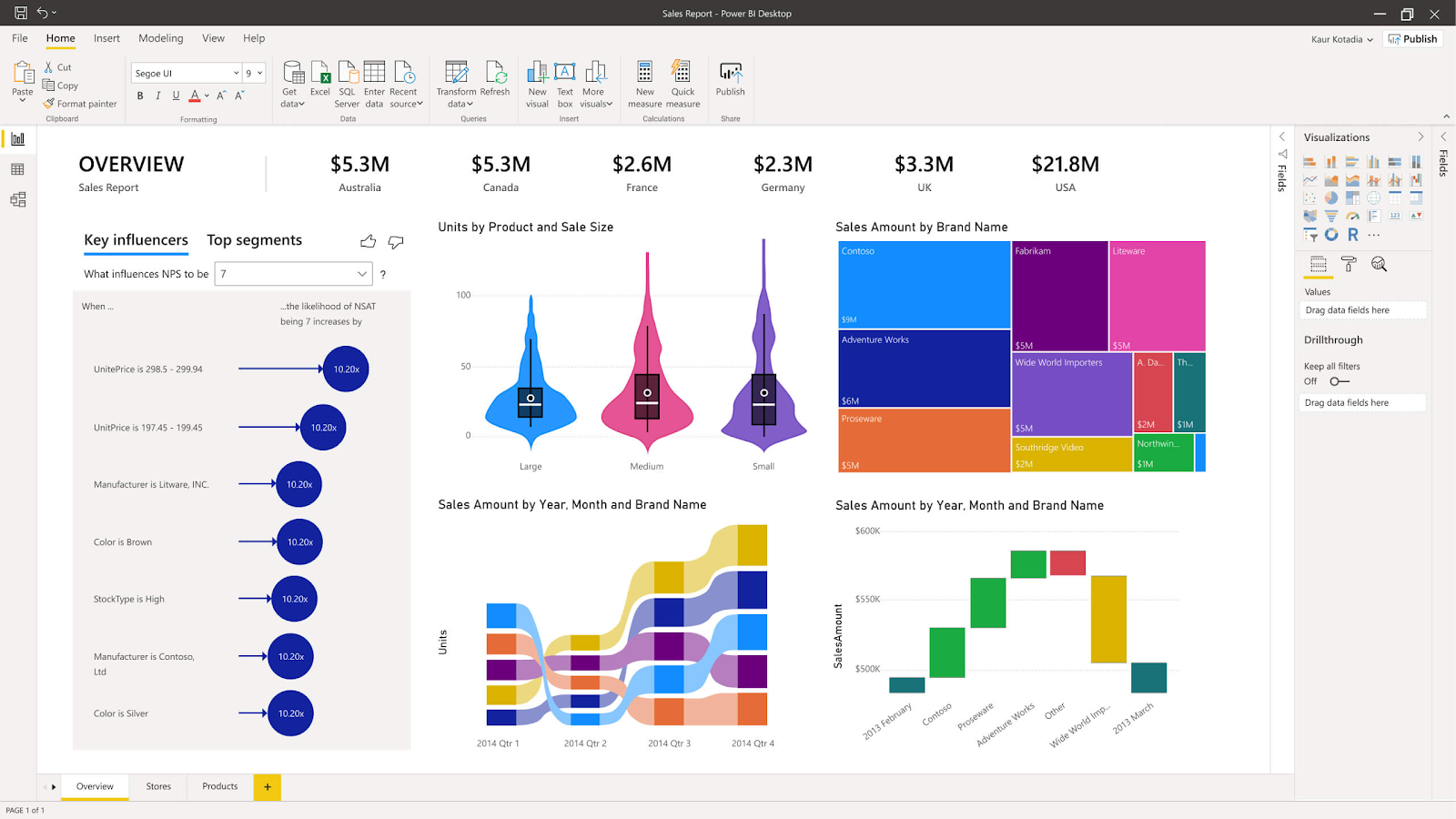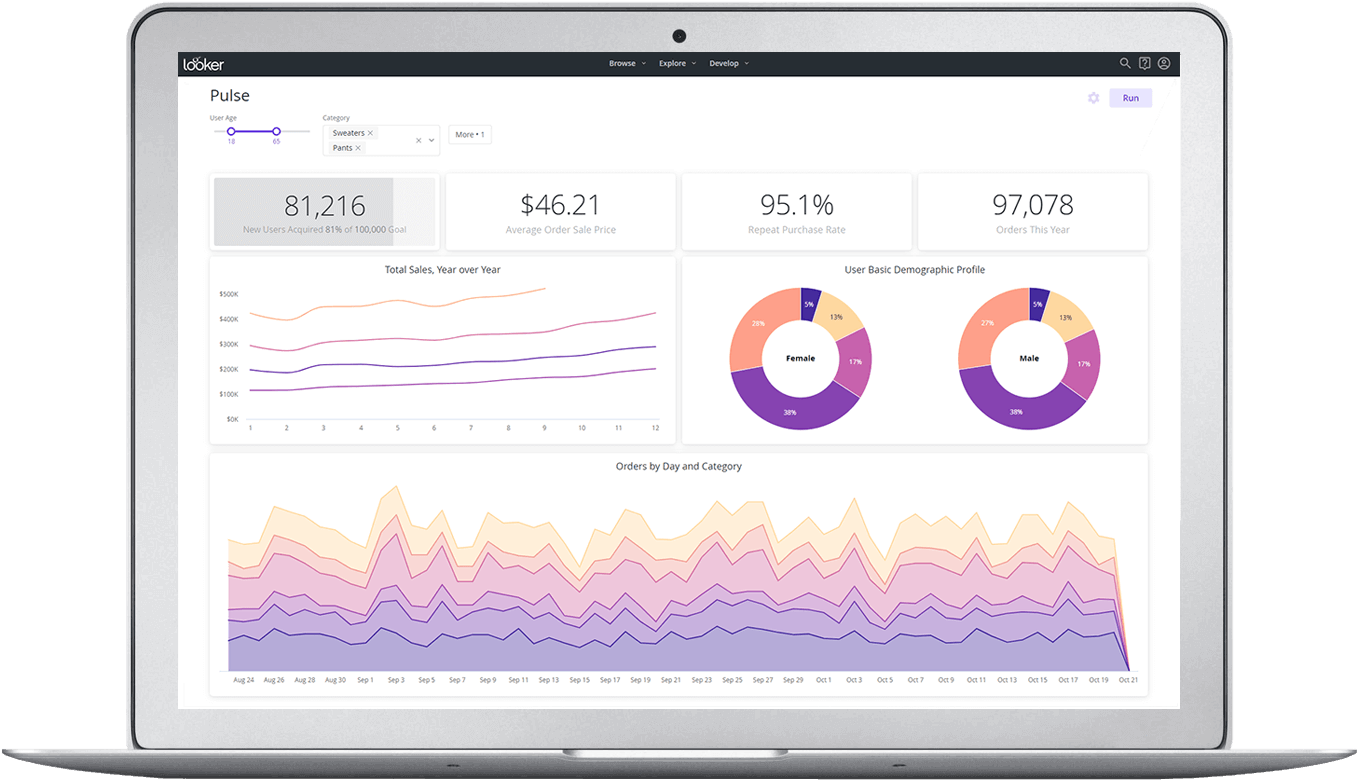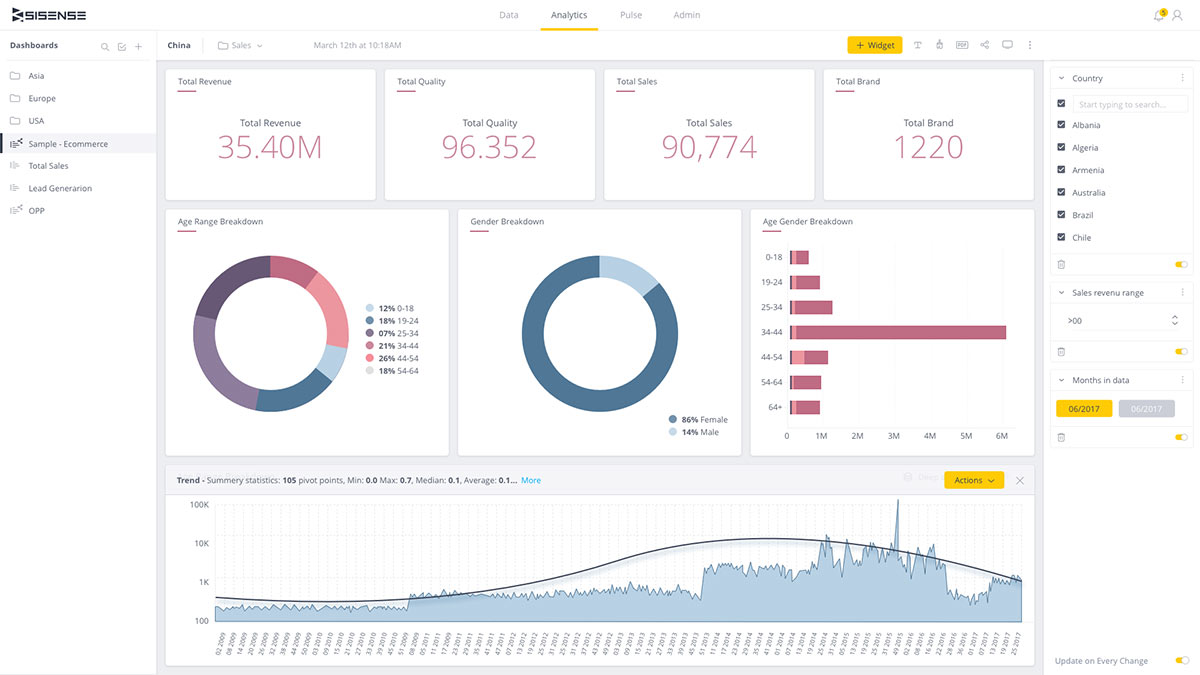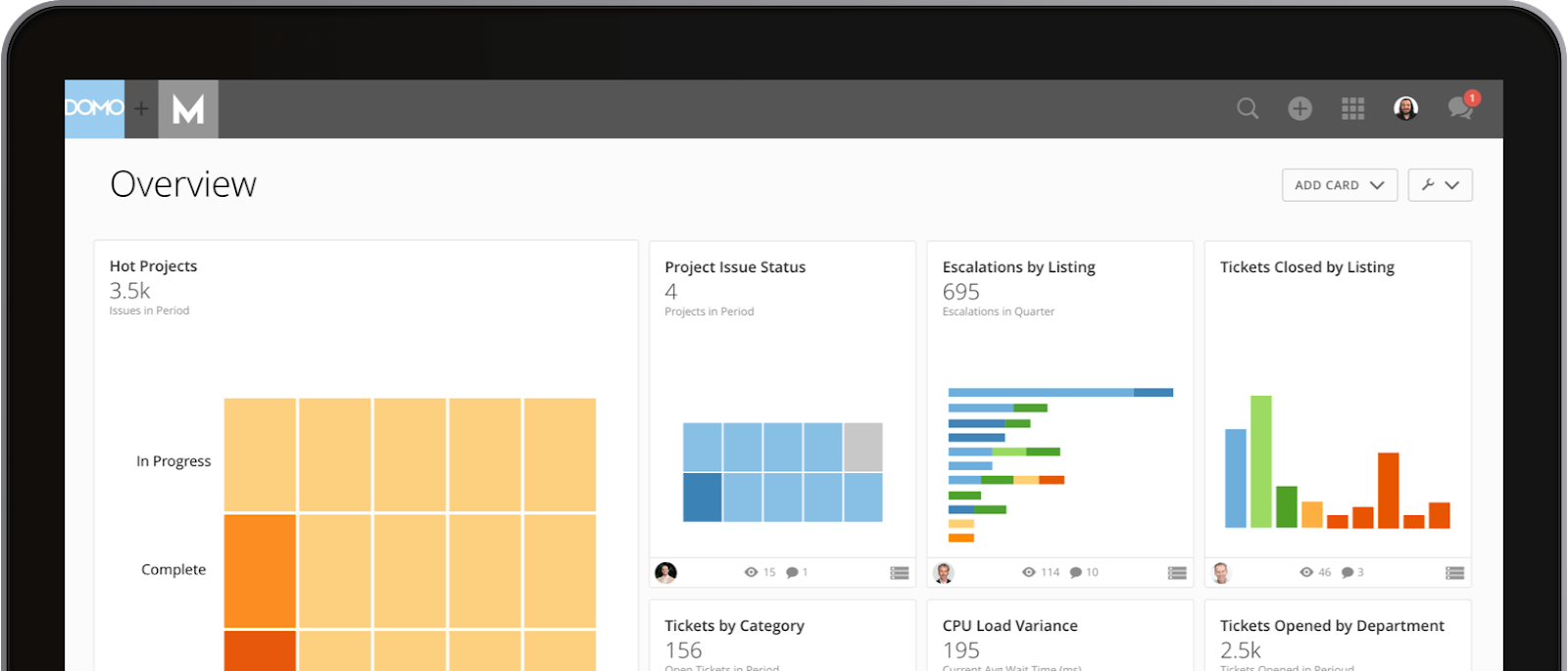We hope you are not from the time when businesses used to practice primitive methods to stay atop the competition. Because if you are, then you will never understand the importance data holds in modern business and marketing. Data is at present fuelling Business intelligence virtually in every industry you can name, with no signs of slowing down.
Here’s a quick definition of Business Intelligence
“The term Business Intelligence (BI) refers to technologies, applications, and practices for the collection, integration, analysis, and presentation of business information.”
BI tools have become an imperative part of any business irrespective of its size and annual revenue because it helps businesses make critical decisions. If you are looking to succeed in today’s times, then it is high time you start investing in data analytics. This is especially true in the case of the eCommerce industry as they have to showcase products relevant to customers. Customer’s expectations have surmounted and without proper tools, it is extremely difficult to predict their needs.
So, just being good enough is not enough, it is time to make it great with these E-commerce relevant BI tools.
The need for BI in e-commerce
A survey taken by the Business application Research Center highlighted that BI has swelled in demand so much that there are multiple use cases of big data in the e-Commerce industry which includes all the retail and marketplace solutions too. The most trending areas in BI are master data, data quality management, visualization, and establishing a data-driven culture. E-commerce is an industry that needs data analytics because it answers many questions like:
- How effective has the advertising strategy been in acquiring new customers and generating inquiries?
- What has been the propensity of buying among existing customers?
- Are the customers reaching the desired pages?
- What is the overall responsiveness of customers towards your marketing campaigns?
- What is the price sensitivity of the customers?
When you need answers to these questions, you need an abundance of information followed by an analytical approach. If you try to do it manually, it would not only be expensive but a time-taking affair with the possibility of counterfeit data. But with BI tools, power not just your analytics but design strategies based on the insights gained. We will explore 5 of the best BI tools currently positioned in the market. Let’s go ahead.
Tableau

Source: Tableau
We give the numero uno position to Tableau because it has unleashed a whole new set of data analytics tools disrupting the world of Business Intelligence. Tableau’s public version was successfully released in 2010 and since then it has become the most popular data analytics solution next to Microsoft’s Power BI. Users of Tableau believe that it has a user-friendly interface that enables even the non-technical users to create customized dashboards and easily comprehensible navigation allowing them to figure out hordes of data.
For the ease of operation, and providing need-based analytics, Tableau has a separate set of solutions for individuals and for larger teams or organizations. But the commonality of both the packages is its focus on data visualization and power users with the ability to bunch-up the data from diverse sources. Tableau’s embedded analytics can be easily integrated with your existing data infrastructure in the cloud. With simplistic and easy to use drop and drag modules, users can explore through the mountains of data and make sense out of it.
Why it’s great for E-commerce
It has an intuitive and immersive interface allowing non-tech users to easily work on it.
It can be conveniently collaborated with other tools like your CRM to embed analytical dashboards and illustrations within the interface.
It enables an extremely granular Ecommerce data pattern by providing products like the Prep or Mobile that saves considerable time and effort at every step.
Pricing Plan
| Tableau Creator | $70 billed/ user/month – billed annually |
| Tableau Explorer | $35 billed/ user/month – billed annually |
| Tableau Viewer | $12 billed/ user/month – billed annually |
Microsoft Power BI

Source: Power BI
No doubt this comes a close second to Tableau, but Microsoft’s taken on BI and data visualization is no less than being one of the best. It is a cloud-based solution that allows users to evaluate and visualize mountains of data with rapidity and efficiency. Over the years of its existence, it has worked with numerous data service providers and pre-built dashboards to increase the TAT for collecting data. Power BI also can interconnect different data sources on-premises and in the cloud so that data is accessible from both web and mobile versions or from the system,
Why it’s great for E-commerce
- The product comes with a free desktop version, which might not be beneficial for larger stores but definitely for smaller stores.
- It has a complicated manner of generating dashboards compared to other tools, yet it scores in its extensiveness of data visualizations.
- The platform offers a singular advantage of an easy collection of data from sources and provides an instantaneous analysis.
- Great resources on how the platform could be used especially for those companies who want to cross-over to advance BI tools.
- If you are looking at going beyond the usual desktop version, it offers the Power BI Pro and Power BI Premium with BI features that enable users to manage large sets of data, collaborate on reports which can be converted into interactive presentations.
Pricing plan
| Power BI Pro | $9.99 per user per month |
| Power BI premium | $4,995 per user per month with cloud compute and storage resource |
Looker
 Source: Looker
Source: Looker
Looker as a BI tool is a must-include because by the looks and features it resembles the previous two we talked about. But, it has a differentiator which is that it works in-database and supports warehouses like Redshift and PostgreSQL implying real-time data access with reports and dashboards with zero security risks. There is no need for any extra software installation. Looker has its own language ‘LookML’ allowing users to rapidly build SQL queries without the need to have any data analytics experience. The search functionality is not much of a concern as it is pretty flexible allowing you to search for data just like you would do on Google.
Why it’s great for E-commerce
- For E-commerce applications, Looker offers customized modules that are destined to undertake specific tasks. There is no need to code anything or generate standards for the dashboard from the beginning.
- It has specific functionalities designed specifically for eCommerce stores. It has the brand module as well as the category affinity module that provides valuable data of correlation between brands and products. It gives a spectrum of information helping stores to cross-sell and upsell which can save a lot on costs required to directly sell.
Pricing policy
The organization does not reveal its pricing policy as it works on a customized basis.
Sisense

Source: Sisense
Being an end-to-end full-stack BI tool, Sisense since its inception has needed no additional add-ons for predictive analysis. Data can be conveniently extracted and processed from the server’s cache enabling faster processing of data. Its platform offers cost-effective profferings with its RAM-powered data processing. Its in-chip technology offloads RAM leading to better resource management with a data warehouse.
Why it’s great for E-commerce
- The BI tool is powerfully equipped with many features like the automatic data recognition that helps stores to identify which sets of data are important and which they need to discard.
- Even smaller stores can afford the BI tools as its flexible pricing policy will provide you with features that suits the store as well as the budget
- Driving data is easier because it has an interactive and intuitive interface.
- It has inbuilt mechanisms to pick observations from past history and bring it to forth so that stores can take care of it. It also has customized dashboards for eg the retail dashboard template provides five dashboards that help in gap analysis.
Pricing policy
This BI tool also offers customized pricing. Pay as you use functionality is operative here.
Domo

Source: Domo
Any list of BI tools will be incomplete without this heavy-weight tool. Users with no prior BI use experience can use this tool with equal ease as a professional does. It has more than 1000 pre-built connectors for data collection from diverse cloud zones. Such data can be easily collected, analyzed, and further processed to derive insights useful for stores.
Why It’s good for E-commerce
- If you are looking at a great visibility factor for your eCommerce store then Domo has a variety of features like the supply chain management feature to achieve operational efficiencies.
- Also, owners of E-commerce stores can understand specific trends as the application has the built-in predictive capability that can help organizations to pinpoint seasonal trends that are great for weathering the unpredictability in supply chain management.
- It has a feature called Magic ETL that stands out. This feature presents a set of tools that will help you create data streams in a format convenient and those required by you.
- The unique drag-and-drop functionality will help users to catch hold of data from anywhere and convert it in a manner required.
Pricing policy
No fixed pricing policy, need-based pricing policy
How to choose the right one
Eventually, it is all about your requirement. We have listed only 5 but there are several others in the space that would suit your needs. If you are still not sure then reach out to us because we have years of experience in consulting on scalable and workable BI solutions for e-commerce. We will not just advise but also help you implement it.







